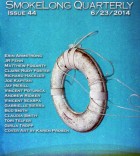So, talk if you would about your use of tennis here. There’s a perception (which may very well be erroneous) that it’s the sport of the financially elite, and that’s underscored in the first scene. Particularly, the thought “we are the most intelligent race.” Could you speak about the image of the game in contrast to some of the other things mentioned in your piece (i.e. the revolution)?
I passed a tennis club just today as I went for a walk to a reserve and sometimes I have seen people playing there. A place that looks drab in the drizzle of approaching winter. There is little difference between this local tennis group and, seen through grey second-storey windows, gym types bouncing to music. What they do have in common is a sense of belonging. Tennis is something to make a club out of. I have not seen many tennis clubs travelling through the U.S. so its hierarchical considerations may be regional, and era-specific (Easy Rider, 1969) as well.
The father is at a club but has had set himself above it. The narrator has only a vague idea of how the world fits together and about the revolution. I am fascinated by the way details accrete in the mind until the left brain completes the jigsaw.
What is the relevance of the girl cousin who looks like a movie star? Is she a class distinction within a class distinction? Another echelon of the family?
The girl cousin has distinguished herself by her movie-star quality. Everyone is jostling for a place in an amorphous world that mirrors a lack of internal anchors. I hoped by the reference to Easy Rider to suggest that we are in the late sixties, and by the reference to Beirut, that we are somewhere south of there. The world was still being made manifest at that time. We know so much more about the world now from reading The New Yorker, where writing about distant places appears to give me a strong sense of knowing them. I recall my first time in Los Angeles where I beheld the marvel of an LAPD police car and felt a strange sense of movie-world and real-world collision.
There’s a recurring theme of movies in the story. Can you speak about that for a bit in relationship to the character? In fact parts of the story have a certain Gatsby-esque old Hollywood feel about them.
I hadn’t seen the Gatsby in it, so thank you. Other people’s observations of my work often give me a place to go next. Well, movies—ever since my Los Angeles friends immersed me into their Hollywood world, I have a whole other library of references.
One cannot get away with a vague geography in films. At least, I don’t think so. Movies have rules to abide by, and since they are seen by a lot of people, there is a dialogue about what is “really” going on, as opposed to the internal reels each of us might experience. I believe we are all mostly blind, feeling the world through our senses and reporting it to each other ’til we reach some sort of solidity.
Do you have a different process for writing flash than you do for other kinds of writing? What other kinds of works have you published? Are you working on something now?
These days the flash comes to me, rarely the other way around. I can be regimented about other kinds of writing but flash fiction arrives in its own good time. Unexpectedly at the moment, a series of flashes are “arriving” to continue in narrative progression from Bravado—and I have no idea where that might lead. Other work—I have written short stories that have found glorious homes. I plan novels, then write them off-plan. I am working on one of my two novel projects that has undergone a few drafts, and I plan to rewrite from scratch in August. My novels seem to be surreal and otherworldly, a kind of genre bend, and this bothers me. I would like to write a conventional realist novel but it has not worked out that way.
I admire nonfiction writers but have not felt adequate to the task of writing it.
What kind of a tennis player are you? Are you a naturally competitive person?
No kind of tennis player at all, but I compete against myself all the time. I am learning to give that a rest, and having examined non-attachment as a useful measure, I’ve found that in being genuinely humble, my writing has flowed. Since arrogance can come too easily to me, as it does to the father here, I can suffer from the fate of being karate chopped at the knees.



 The core workshop of SmokeLong Fitness is all in writing, so you can take part from anywhere at anytime. We are excited about creating a supportive, consistent and structured environment for flash writers to work on their craft in a community. We are thrilled and proud to say that our workshop participants have won, placed, or been listed in every major flash competition. Community works.
The core workshop of SmokeLong Fitness is all in writing, so you can take part from anywhere at anytime. We are excited about creating a supportive, consistent and structured environment for flash writers to work on their craft in a community. We are thrilled and proud to say that our workshop participants have won, placed, or been listed in every major flash competition. Community works.